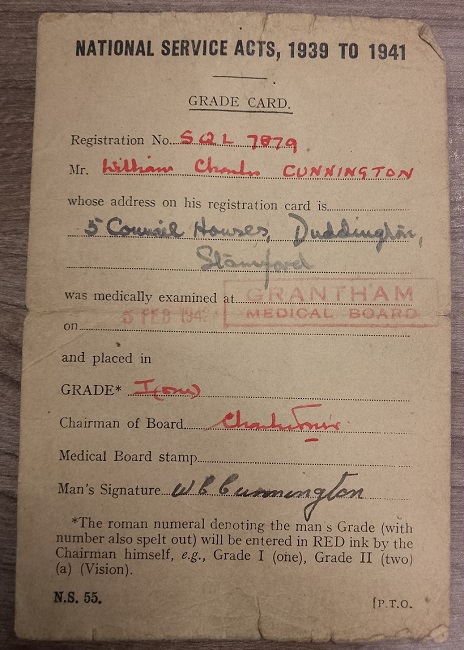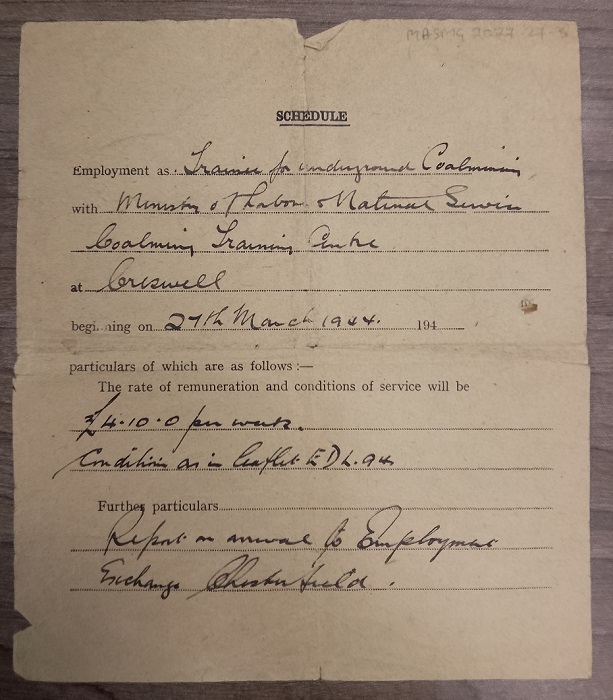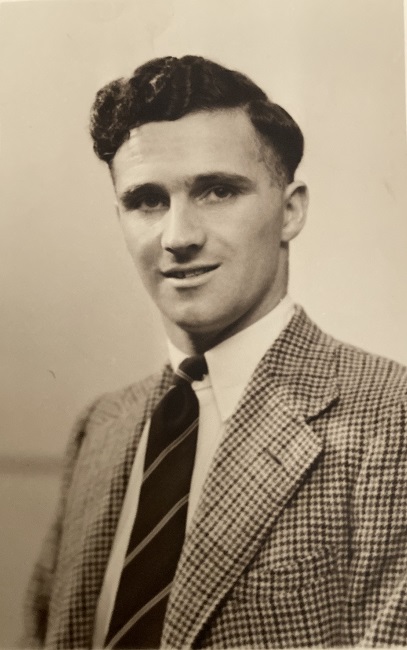Dig for Britain
Dig for Britain
Revealing the story of the men whose war service was in the coal mines

Detail of oil painting "Brookhill Colliery, Pinxton, Derbyshire" by H. M. Sutton
Earlier this year the museum received an exciting gift from a donor named Lionel Cunnington. The donation included four official documents, which give a glimpse into the wartime experience of his father, Bill. Rather than being trained for the armed forces, Bill was assigned to the Nottinghamshire collieries, as one of the so-called 'Bevin Boys'. Lionel has kindly written this blog post to explain more about his father's experience, and the often overlooked role of these men.
Anja Thompson-Rohde, Collections and Interpretation Officer

Medical report on W Cunnington declaring him grade 1, fit for service, February 1942
Bill the Bevin Boy
As the eightieth anniversary of V.E. Day nears, I would like to share some recollections of my father’s war. William Cunnington, known as Bill, was part of that still little-known group of conscripts – a Bevin Boy.

Official form assigning W.Cunnington for "Training for underground Coalmining", March 1944
By the middle of the war, 1942-43, Britain faced a problem with coal production. Millions of tons were needed annually to fuel the factories producing the armaments needed on a massive scale in this industrialized war – the war industries were of vital importance in producing the weapons the fighting man needed to defeat Germany.
Coal stocks had become low, the country was short of some 78, 000 miners. Many had joined the armed forces, although mining was a reserved occupation, and there was also a great deal of absenteeism.
The solution proposed by Ernest Bevin, Minister of Labour and National Service in the wartime coalition government, was a scheme where 10% of those called up would be directed into mining rather than the armed forces. Those selected would be chosen by ballot, depending on your National Service call up number. If you were fit enough, you went down the mine! These conscripts, from all walks of society, were known as Bevin Boys, the scheme ran from 1943 to 1948 and 21,800 Bevin Boys were called up. Bill Cunnington was one of those.
Bill, was born on 21st November 1920 in Collyweston, Northamptonshire, the fourth child of Charles Ernest Edward and Elizabeth Cunnington. His elder siblings, Louisa, Ernest and Harry were born before the First World War, his younger sister Lily followed him.
Bill moved down the road to Duddington, where he attended Duddington Elementary School. Leaving school at fourteen, his first job was, like most village boys, working on a local farm. When war broke out in 1939, he became a lorry driver, working for “Measures”, of Market Deeping. Due to the war time emergency, he was not required to take a driving test, and, indeed, never took a driving test in his lifetime! One of his jobs was to carry stone to help construct Spanhoe aerodrome near Laxton, Northamptonshire, later to be the home of the 315th Troop Carrier Group, United States Army Air Force. While awaiting call up, Bill also served with the local Home Guard – Duddington’s answer to Private Pike!

Bill Cunnington, taken sometime in the 1940s
Bill was called for a medical at Grantham, reporting for an appointment at 1.30 p.m. He was Grade One, (A) the highest level of fitness. He was sent home to await call up and in normal circumstances would probably have been taken by the army. But Mr Bevin intervened, and Bill, with his national service number SQL 7879, was in the ballot for the mines – “If your number ends in 9, you are going down the mine” is the ditty that Bill always remembered.
Bill was assigned to Cresswell Colliery, Bolsover, Derbyshire for his training for underground coalmining, commencing on 27th March 1944. His weekly pay was 4 pounds ten shillings (£4.50) per week. While in Bolsover, Bill lived at 24 Houghton Crescent.

Official form assigning W.Cunnington to Sherwood Colliery, April 1944, including travel details
Training complete, Bill was assigned to the Sherwood Colliery in Mansfield, “at district rates and conditions”, being told to report by 8 a.m. on 24th April. Travel was to be by bus. While at Sherwood, Bill moved to Mansfield and lived with Mr. and Mrs. Middleton, who had a son Roy of similar age, and who was also a miner.
Bill was not allowed to work at the coalface, but worked moving the tubs full of coal. He said that initially Bevin Boys were made to feel unwelcome, but that later changed. After spending most of his life outside, Bill did not like being underground. He did say, though, that at least no one was shooting at him, and he was relatively well paid, although there was little to spend the money on. Pay was one guinea (twenty-one shillings, £1.05) per shift, for six shifts per week. Bill did, though, find time to get engaged to a girl from Northumberland, although that wartime romance did not last and the lady moved back to Northumberland!
And so the war ended, Germany and Japan surrendered and Bill was able to return home to Duddington to carry on with his life. And what became of the participants of this blog?
Ernest Bevin became a very successful Foreign Secretary in the post war Labour Government, and was one of the main drivers that led to the formation of the North Atlantic Treaty Organisation in 1949. But was his greatest contribution to this country his wartime office of Minister of Labour and National Service?
As for Bill, he returned home but kept in touch with the Middleton family, I believe that Roy became a Deputy in the mines.
Lionel Cunnington, J.P.
FIND OUT MORE
Click here to see details of Bill Cunnington's documents on our online catalogue.
You can find out more about the men who worked in the mines during the Second World War from the Bevin Boys Association. Click here to visit their website.
